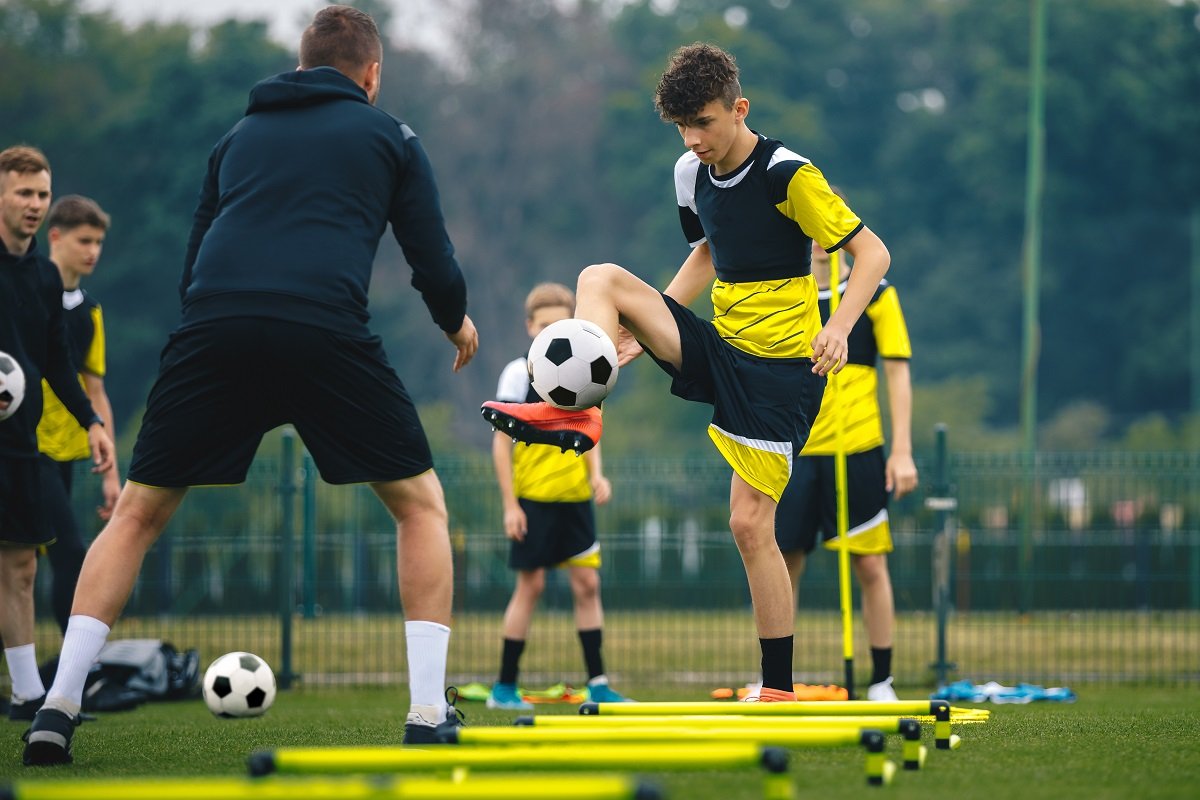
Do you love football and have a passion for helping others learn? Then, you might be attracted to becoming a football coach, whether that is at the grassroots level or in the professional leagues. For those interested in football coaching but needing help knowing where to start, this guide provides advice and tips for how to become a football coach at a grassroots level and beyond.
Gain the correct qualifications
To become a football coach in the UK, you don’t necessarily need qualifications if you want to work at the grassroots level. However, it is advised and becomes necessary if you want to coach at a serious level.
Discover the football coach qualifications below, with two qualifications highlighted to get you started.
EE Playmaker by England Football
If you are interested in taking a more active role in grassroots football, the EE Playmaker by England Football course is for you.
This free entry-level qualification takes place entirely online, making it easily accessible. Describing the course and whom it is aimed for, England Football says: “You might be someone who wants to help out the coach at your child's club, or someone keen to get more involved at your school, college or uni football team. It might be that you love your walking football and want to bring some new skills to improve everyone's experience.”
No previous experience is required, and after taking the course, you will have the confidence and basic skills to help at your local grassroots club or training centre.
Introduction to Coaching Football
If you are interested in more than just helping out at your local club and would like to become a proper football coach, the Introduction to Coaching Football is the FA’s level 1 football coaching qualification.
For those currently coaching at lower levels or looking to get into football coaching, this online course will see you work through a series of modules to obtain the qualification.
The FA shares: “The Introduction to Coaching Football course will support you to run a team within a safe, fun and enjoyable football environment. If you are the coach of a team in a youth charter standard club, you will need to complete this course for your role.”
READ ALSO: What is grassroots football?
If you want to learn how to become a coach at a professional football club, you will need to achieve higher levels of football qualifications. More info can be found below.
Further football coach qualifications
- UEFA C Licence - Delivered through virtual and face-to-face learning, expert Coach Developers will guide you through the UEFA C Licence, supporting you as you tailor it to your players.
- UEFA B Licence - The UEFA B Licence helps coaches understand the demands of the game and meet the needs of players within the team.
- UEFA A Licence - The UEFA A Licence is the highest level of practical coaching course offered by the FA - holding this qualification can lead to coaching within the professional game in senior or youth development environments.
- UEFA Pro Licence - This course is designed for those who want to work at the very top of the game in leadership and management positions within the Premier League, Football League, FA Women’s Super League and the international game.
Get a DBS Check Certificate

If you want to become a football coach in the UK, one of the first things you can do is get a DBS Check Certificate. This basic background check confirms the applicant’s criminal record and, therefore, their suitability for working with children and vulnerable adults.
How to become a children’s football coach
Suppose you want to start coaching children’s football. In that case, a DBS Certificate will be required, so ensure you get this taken care of before you pursue qualifications and available coaching positions. Most clubs will require a DBS Check even if you won’t typically be working with children.
You can find out more and apply for a DBS Check here.
If you want to coach elite youth players at a professional academy, you can take the Advanced Youth Award course once you have your UEFA B Licence.
Gain experience
All employers like candidates with experience, and this includes football clubs. Therefore, gaining experience working with players will be invaluable in your aspirations to become a football coach.
You can start building experience by assisting at your local Sunday League team or grassroots kids club. Once you have begun achieving your qualifications, you can apply for roles as an assistant coach or at a football academy.
As your experience starts to grow and your skills develop, you will be well-placed to apply for a football coaching role at various levels of the game.
READ ALSO: How to start a Sunday league team
How to become a football coach with no experience
Of course, we all want to achieve that dream role straight away, and while there are no shortcuts in football coaching, if you want to know how to become a football coach without experience, make sure you have as many qualifications as possible (UEFA Licences C – A). This way, clubs will know you have what it takes to coach at their level.
With some qualifications under your belt, you might be able to land a coaching role at a local club or further afield. Just remember, you have to start somewhere.
Build a network of contacts
The next step in becoming a football coach is to start building a network of contacts. By attending various courses, conferences, and events, you can meet people in the industry and form connections. This way, you will be more likely to land future roles, as those hiring might already be familiar with you or be able to recommend you to others who need a football coach.
Specialise in a particular area

Once you have started building your experience and gaining qualifications, you can consider specialising in a particular area of coaching, such as goalkeeping or strength and conditioning, via additional courses and training.
By doing so, you can obtain a valuable, specialised skillset that will make you well placed to land a coaching role at a club, especially if you want to move beyond grassroots coaching. Of course, you don’t have to specialise, but it can be a helpful way to progress your career if desired.
Start applying for coaching jobs
The last stage of your journey to becoming a football coach in the UK is to start applying for coaching jobs. When you have got some qualifications under your belt and a bit of experience helping out at the grassroots level, you can see what is available and submit your application.
The website Jobs in Football is a great place to begin your search, allowing you to search for different roles across the world.
The EFL also lists coaching jobs and other football roles on their website.
Steps for becoming a football coach
- Gain the correct qualifications
- Get a DBS certificate
- Gain experience
- Build a network of contacts
- Specialise in a particular area
- Start applying for coaching jobs
How much does it cost to become a football coach?
The cost of becoming a football coach varies depending on your aspirations and how far down the qualifications route you want to go.
It could cost nothing to start volunteering at your local club or coaching the local kid’s team, even with the free EE Playmaker by England Football course.
The other qualifications require a fee to join the course:
- Introduction to Coaching Football: £160
- UEFA C Licence: £500
- UEFA B Licence: £960
- UEFA A Licence: £3,465
- UEFA Pro Licence: £9,890
What skills are important in football coaching?

There are various important skills that are important for football coaches:
- Knowledge of football tactics, as well as drills and training methods
- The ability to communicate effectively with players, referees, and staff
- Good leadership, organisation, and motivational skills
- The ability to analyse player performance and provide feedback
- The ability to adapt to different playing styles and levels of competition
- Experience of playing or coaching football
What equipment does a football coach need?
Once you start coaching, you will need certain football training equipment in order to train your players effectively. You won’t need to worry about acquiring any kit if you land a job at a top club, but at the grassroots level, there might be a bit of shopping involved.
For example, there are essentials like footballs to stock up on, as well as football pumps, and items like flat markers and football bibs always come in handy.
Explained: How to become a football coach in the UK
To summarise, in order to become a football coach, you will typically need some training, even when coaching children at the grassroots level. For those who want to progress to coaching higher-level players, you will need to get qualifications, which range from the FA’s Introduction to Coaching Football to the UEFA Pro Licence. From there, you can build your experience coaching at lower levels and applying for jobs.
READ ALSO: Football team names recommended by ChatGPT for a Sunday League club
We hope this article has been helpful and will start you along the path to becoming a future football coach. If you need any football products for your team or training centre, Diamond Football supplies every Premier League club, so we certainly have you covered.
For more tips, guides, and advice, make sure to visit our news page.





